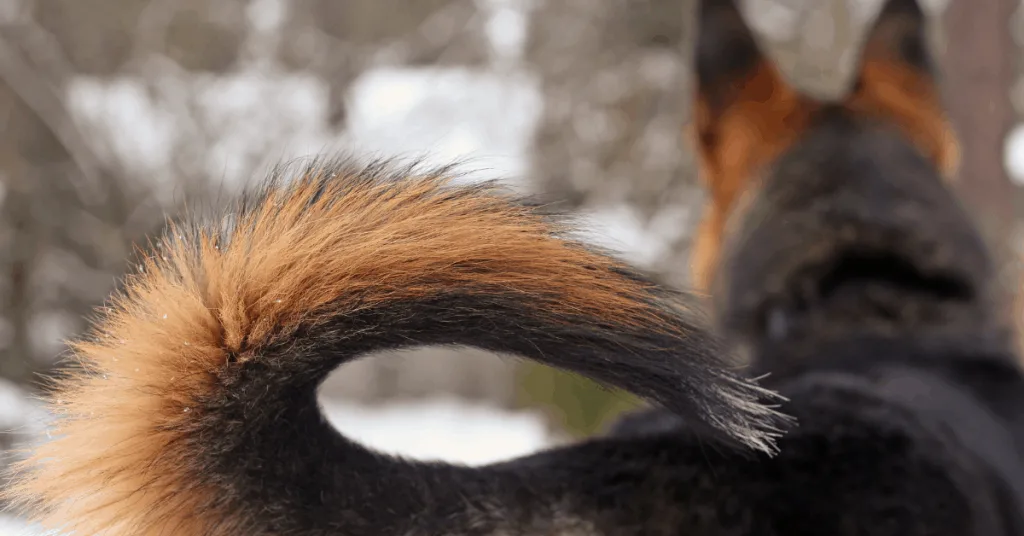
Watching your German Shepherd puppy chase their tail is adorable. Watching your adult German Shepherd chase their tail can be comical, but it can also be concerning. A twirl here and there is fine, but your German Shepherd’s tail-chasing behavior can indicate a health problem or even become a problem in itself.
Tail-chasing behavior in German Shepherds can be innocent or a sign that something is wrong. As puppies, they chase their tails out of curiosity. As they age, German Shepherds may chase their tails because of discomfort, pain, boredom, or stress. Tail chasing can also develop into an obsessive habit.
Tail-chasing behavior in German Shepherds can be innocent, or it can be a symptom of an underlying problem. So why do German Shepherds chase their tails, and when or how should you stop them?
Click Here to Jump to a Section
German Shepherd Puppies Chase Their Tails Out Of Curiosity
Puppies are funny creatures. It is fun to watch them explore the world and watch them figure out how they fit into the world.
Puppies often don’t know they have a tail. So, when your German Shepherd puppy catches sight of this strange thing following them around, they try to catch it to find out what it is.
A German Shepherd puppy will bark and growl at their tail but seem very confused when they catch their quarry because it’s attached!
Puppies are not likely to keep chasing their tails if they don’t catch them, although they can do it long enough to get a bit dizzy; they get bored and will move onto another game.
German Shepherds Chase Their Tails Because Of Their Breed History
German Shepherds were initially bred as herders. This means that their chasing instincts are well-developed. German Shepherds are also like humans in that they have front-field vision with blind spots in the periphery.
To learn all about German Shepherd vision, be sure to read this excellent article: Are German Shepherds Color Blind?
If your German Shepherd’s tail moves in their peripheral vision, it may look like something running behind your dog. Their chasing instincts will kick in, and they will whirl around to try and catch whatever is moving. It may take them a moment to realize that it is their own tail they are chasing.
German Shepherds Chase Their Tails Because Of Your Reaction
If you think the sight of your German Shepherd chasing their tail is too funny, and you laugh and encourage the behavior, or even give them treats as a reward for being so adorable, then your dog can learn this pattern.
Every time they want attention or treats, they will come and chase their tail in front of you to elicit the response they have come to expect.
German Shepherds also thrive on pleasing their owners, so if they know tail-chasing makes you happy, they will repeat the behavior for your benefit.
German Shepherds Chase Their Tails Because They Are Uncomfortable Or In Pain
German Shepherds can chase their tails in response to rear-end distress. If they have a cut or a sore spot on their tail, they may try to chase it in an effort to lick the cut or pained area.
Dog saliva often helps prevent infections, and the action of licking can reduce pain, so the desire to lick is instinctive.
German Shepherds also try to catch their tails if they have a parasite problem. Worms often lead to itchy rear ends, and ticks and fleas can also bite your German Shepherd’s tail and trigger tail catching as they try to stop the itch.
Fleas and ticks are not likely to only be on your German Shepherd’s tail, so watch for a general increase in scratching.
Rashes from allergies can also be itchy and uncomfortable and cause your German Shepherd to chase its tail. These rashes can be isolated to one spot, or they can be widespread (if caused by shampoo, etc.). If it is widespread, you will notice other signs of itchiness.
Related: German Shepherd Allergies: All You Need To Know
If discomfort or pain is the cause of the tail chasing, German Shepherds won’t just let their tail go once they catch it; they will bite at it or lick it. If they don’t manage to catch it, they will sit down and twist around to reach the offending spot.
German Shepherds Chase Their Tails Out Of Boredom

German Shepherds are active dogs and require both physical and mental stimulation to be happy. As such, they are quite high-maintenance, and you should only get a German Shepherd if you are willing to expend time and effort on them.
If your German Shepherd is not sufficiently entertained and exercised, they may start chasing their tail to entertain themselves or burn off some energy.
This can be bad for them as German Shepherds are prone to obsessive behavior and can develop destructive habits. Furthermore, this isn’t good for you as your large twirling dog can bump into furniture and break things.
A useful way to combat your German Shepherd’s boredom is by giving your dog an interactive puzzle toy to play with. Puzzle toys, like this one by Outward Hound, use food and treats as an incentive to get your dog mentally engaged.
German Shepherds Chase Their Tails Because They Are Stressed Or Anxious
German Shepherds are easily distressed and predisposed to anxiety disorders, especially if they are not socialized as puppies. There is a theory that tail-chasing causes the release of a hormone in your German Shepherd, which calms them down.
Related: How To Socialize Your German Shepherd
If you notice that tail-chasing coincides with loud noises, being separated from you (or the prospect thereof), or big crowds, it may be that your German Shepherd is anxious.
If the tail chasing is caused by anxiety, you may notice other signs such as barking, jumping, heightened aggression, whining, or running.
If you have rescued your German Shepherd from a shelter, they might have had a traumatic experience that you do not know about. If something triggers their memories of this trauma, they can become anxious, and there may be no clear indication as to why.
Another anxiety-provoking situation is an illness. Your dog may be feeling distressed because they are in pain or do not feel well.
German Shepherds Chase Their Tails As An Obsessive Or Habitual Behavior
German Shepherds very easily form habits as they have an obsessive nature. Any one of the previously stated reasons for tail chasing may lead to the development of obsessive behavior.
It this is the case, then your German Shepherd will chase their tail for no reason. Your German Shepherd is not happy when they are compulsively chasing their own tail, and it can also be very upsetting for an owner to watch.
When To Stop German Shepherds From Chasing Their Tails
If your German Shepherd is still a puppy, tail chasing is not likely to be a problem unless you notice other symptoms that could indicate pain, discomfort, or anxiety.
Also, watch the frequency with which they engage in tail-chasing behavior. Do not discipline your puppy for this behavior, but don’t encourage it either.
Adult German Shepherds who only chase their tails occasionally are probably just playing, but again, don’t encourage the behavior. If you notice a pattern or your German Shepherd is chasing their tail frequently, this can indicate a problem.
If the problem seems to be physical, check their tail for sore spots, cuts, rashes, ticks, or fleas. If you find they have one of these problems, address it to stop chasing their tails before it turns into a bad habit.
If the problem seems to be psychological, try to stop the behavior every time you see it.
How To Stop German Shepherds From Chasing Their Tails
If you notice problematic tail-chasing, take your German Shepherd to the veterinarian to be checked for physical and psychological issues (which might only be diagnosed by eliminating physical causes).
Distract your German Shepherd when they start chasing their tail. Call them over to you or catch their attention and throw a toy.
Sometimes all that is needed is simply to stand up yourself and move around. Your German Shepherd will stop to see what you are doing (although this depends on the cause of the tail-chasing).
Provide your German Shepherd with plenty of mental and physical stimulation to prevent boredom.
Related: How to Keep a German Shepherd Busy While You’re at Work
Don’t shout at your German Shepherd for tail chasing. If they are chasing because they are anxious, this will aggravate the situation.
Additionally, if they are tail chasing for a different reason, you can trigger anxiety by shouting at them; remember, German Shepherds want to please their owners.
You will need patience and persistence when trying to curb tail-chasing behavior. Seek advice and assistance from a behaviorist if you feel overwhelmed.
Final Thoughts
Curious puppies will chase their tails because they don’t really know that the tail belongs to them. Catching sight of their tail in their peripheral vision can trigger a German Shepherd’s instincts to chase.
Some German Shepherds like how you respond when they chase their tails, so if you coo and treat them when they do it, they will keep doing it.
However, not all tail-chasing has an innocent explanation; sometimes, it is a sign of pain, boredom, or stress.
German Shepherds are also prone to obsessive behavior, which means that they cannot stop chasing their tails.
When tail-chasing is a sign of an underlying problem, it is distressing for both dog and owner. Thankfully, there are ways to stop your German Shepherd from chasing its tail, and with some patience and persistence, you can stop the behavior.
